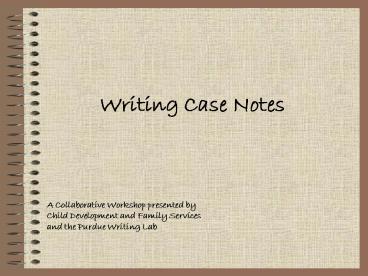Writing Case Notes - PowerPoint PPT Presentation
1 / 16
Title:
Writing Case Notes
Description:
can be used in court, in school, by social agencies, and by ... Good: Chris was biting his nails and shifting in his seat. Key Terminology. evidenced by ... – PowerPoint PPT presentation
Number of Views:1772
Avg rating:3.0/5.0
Title: Writing Case Notes
1
Writing Case Notes
A Collaborative Workshop presented by Child
Development and Family Services and the Purdue
Writing Lab
2
Good Case Notes
- represent the clients situation
- provide a record of client care
- enable an action to be taken based on their
review - can be used in court, in school, by social
agencies, and by insurance companies
3
Documentation is Critical
- to clients and family members
- to health care professional
- to employers and managed care companies
- to licensing and accreditation agencies
4
Types of Case Notes
- DART
- Description
- Assessment
- Response
- Treatment plan
- DAP
- Description
- Assessment
- Plan
5
DART
- Description of the problem and your observations
- Assessment of what may be going on
- Response, or record, of what you did or suggested
- Treatment plan, including goal setting
6
DAP
- Description of the content and the process of the
session - Assessment of what is going on
- Plan for what will be done in the next session
and in the meantime
7
Descriptions
- include objective information
- when they report observable behavior seen by
the therapist - include subjective information
- when they report what the client says or feels
8
Planning and Behavior Goals
- State behavior goals
- in terms of
- Subject/Verb
- Action/Object
- Frequency
- Duration
- Mary will
- give her son positive reinforcement
- at least two times
- every day for a week.
9
Behavior goals should be
- measurable
- observable
- of specific duration
- achievable
- relevant to the problem
- appropriate and consistent with client values
10
Essentials of Record-Keeping
- Be thorough yet concise.
- Write clear, objective descriptions.
- Write notes immediately after the session.
- Proofread, but dont erase information.
- Consider how the client is portrayed.
- Use respectful terminology and avoid jargon.
11
Be Careful with Wording
- Respectful language
- Nonjudgmental writing
- Clear description
- Key terminology
12
Respectful Language
- For information such as race, gender, age,
sexuality, and physical condition - Poor Pat is a 26-year-old handicapped woman.
- Good Pat is a 26-year-old woman with a
disability.
13
Nonjudgmental Writing
- Use
- shows little motivation
- resistant/determined
- uses profanity
- shows passive behavior
- Instead of
- lazy
- stubborn
- foul-mouthed
- just sits there
Poor He looks and smells like he hasnt
bathed in days. Better He has poor hygiene.
14
Clear Description
- Watch for misguiding, non-specific wording.
- Show instead of tell.
- Poor Chris was obviously nervous.
- Good Chris was biting his nails and shifting
in his seat.
15
Key Terminology
- evidenced by
- appears versus seems
- client-active language
- qualifying comments
- Poor From her frown, Carol seems angry.
- Good Carol appears angry, evidenced by her
frown.
16
Maintaining Records
- Sign and date every entry.
- Store the case notes securely.
- Maintain confidentiality.

